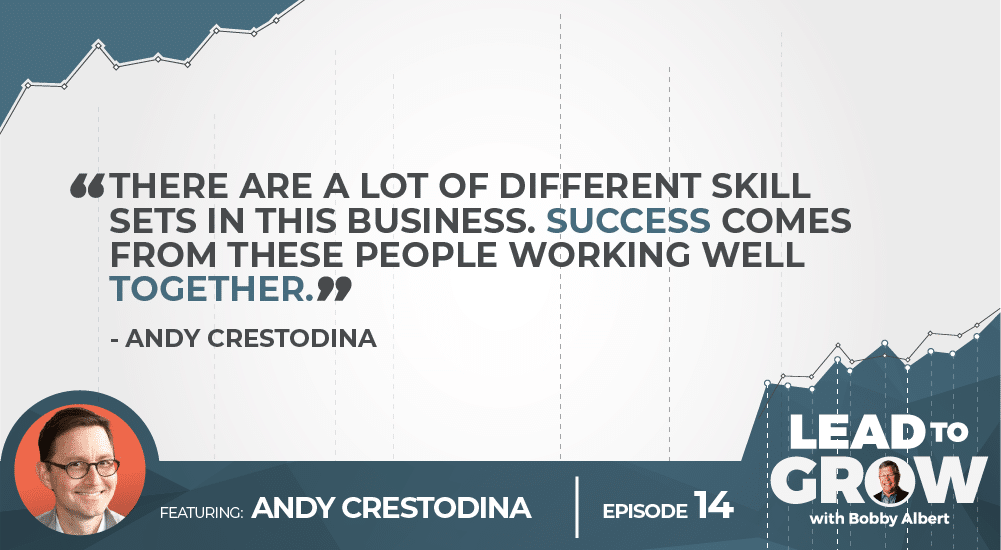Marketing Metrics: The Numbers You Should Be Paying Attention To

Andy Crestodina. His track record includes everything, from earning a degree in Mandarin to working as a teacher in China.
In 2001, Andy and his friend co-founded Orbit Media, a company that has grown from zero to about $4.5M in revenue. Totally organically.
Now, Andy is the CMO at Orbit Media and he's a marketing metrics expert.
Our latest guest on the Lead to Grow podcast, Andy talked with us about his experience and his company. He also shared his metrics expertise, focusing on the metrics you should care about the most, and the ones you should care about the least.
The Problem With Marketing Metrics
According to Andy, the problem with digital marketing metrics is that some of the things that are easy to see and easy to measure are the least important. On the flip side, the often the data that are hardest to see and the hardest to measure are the most important.
For example, it's easy to see how many followers you have on social media. However, this stat doesn't correlate with success. At the other extreme, there are aspects such as customer satisfaction, number of referrals, reviews, word of mouth, net profit, margins, utilization, and capacity. But these are very difficult to quantify.
Julian's Law:
The easier the metric is to see, the less important it is. The harder the number to see, the more important it is.
Andy calls this principle Julian's law, named after his friend Jeff Julian, whom he claims is a marketing genius.
Think about a CEO. They will spend their time analyzing data deep within the business to understand what is making the greatest difference. That has everything to do with the sustainability and the health of the business.
On the other hand, lots of people are doing things they believe are making a difference, but their effort is directed toward factors that have little impact.
Consider Facebook likes. They're not exactly paying the bills.
Uncovering the Right Metrics
Andy says that in marketing, it's a little easier to uncover the right metrics than in general business. He says that marketing metrics almost always come in two types.
First, there are the metrics that illuminate how well you are attracting visitors. Are you getting good visibility? Are you building awareness?
These metrics are usually easy to see. You might find them in the top-level reports in Google Analytics, for example. Or if you're sending emails, look at your open- and click-through rates.
The second type of marketing metric you should be monitoring is the percent of your visitors who are taking action. You might know this metric as a conversion rate, and it can be tricky to track.
To get a good conversion rate, your website has to be set up properly to track the percentage of visitors who make it to a thank you page after becoming a lead. Even then, there are gaps in analytics. For example, how do you track what percentage of website visitors pick up the phone and call, as opposed to converting through the website? Even though it's difficult to monitor, conversion rates are crucial.
Expanding our discussion a bit, business metrics can go all the way down to net revenue, net profit, and margins. Above that you would have sales closing rates, marketing qualified leads, sales qualified leads, etc. Again, Andy has sage advice: The closer to the bank account, the more important.
Don't Forget Culture
If you're going the extra mile to monitor the less visible metrics that truly matter, don't neglect your company's culture. If you're nailing your conversion rates, but your team can't work together, are you really succeeding?
According to Andy, web design and development can be an emotional and stressful process. It's a creative design process, so it's important that clients genuinely feel good about their website. On top of that, many factors determine whether or not the project succeeds.
Because of these challenges, Andy needs to keep his team motivated, lighthearted, and working well together. To accomplish this, Andy's company has a committee in charge of putting together fun events. These might include taco day, a waffle baking contest, a chili cook-off, or a game of kickball.
There are a lot of different skill sets in Andy's business – programmers, designers, project managers, and strategists, to name a few. Success comes from these people working well together, even though they have very different types of skills, resources, and personality types.
For that reason, it's all the more important to keep everyone happy and working together.
Conclusion
Pay attention to your metrics. Make sure your business is running smoothly, and your customers are happy. But don't forget about your internal customers: your employees.
Keep them happy, too.
This blog post is from a podcast interview with Andy Crestodina of Orbit Media. Andy wrote a post featuring similar content that you can view on his blog by clicking here.
Click here to hear this full episode. If you don't use iTunes, you can also find the full list of episodes by clicking this link.



